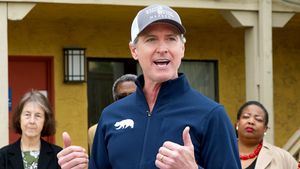
Treatment GuideJust DiagnosedSex & DatingAfrican AmericanStigmaAsk the HIV DocPrEP En EspañolNewsVoicesPrint IssueVideoOut 100
CONTACTCAREER OPPORTUNITIESADVERTISE WITH USPRIVACY POLICYPRIVACY PREFERENCESTERMS OF USELEGAL NOTICE
© 2025 Pride Publishing Inc.
All Rights reserved
All Rights reserved
Scroll To Top
By continuing to use our site, you agree to our Privacy Policy and Terms of Use.
No one could have come up with a more frigid $10 word to describe the good loving that can occur between a couple made up of an HIV-positive and an HIV-negative person: serodiscordance. But who says romance between magnets with opposite charges has to be so, well, discordant? It just might be that, for many people, not only can 'opposites' attract, but they also can come together in a way that is truly harmonious. Which is not to say that, as in any relationship, there will not be peaks and valleys on the quest to finally have, to quote When Harry Met Sally', 'a date on national holidays.' So we at HIV Plus have cooked up a few pointers that might bring you closer to that mushy, happy ending to your own romantic comedy, replete with fireworks. First of all, if you meet someone and you are hoping he or she will become more than just a fly-by-night lay, you are going to have to break the big news to this object of your affection. In his book Love in the Time of HIV psychotherapist Michael Mancilla suggests a four-date strategy. He says to start with simple coffee and work your way toward the final, day-long date in the park. Then disclose the information. Then jump into the sack (should the mood strike). This allows some time for intimacy and trust to build but not so much time that your love interest feels trapped or lied to when you break the news. Get rejected? Get over it, says Manhattan shrink Michael Shernoff; otherwise, you are just reinforcing an unhealthy victim status. 'The amount of energy people put into rejection is nuts,' he says. 'It's just rejection, not the end of the world.' Doing the Deed OK, so you have told your future husband, and happily for Marcya Owens, 34, an HIV-positive Illinois resident, the man in your life says the bug is not a good enough reason not to be with you. Now get ready to talk, talk, talk about what place the virus has in the broader scope of your relationship. Robert H. Remien, Ph.D., an expert on serodiscordance in relationships and a research scientist at the HIV Center for Clinical and Behavioral Studies in New York City, says, 'Don't ignore [HIV]. Don't make it the elephant in the room, but also don't make it the elephant you have to talk about all the time.' Ron Lovejoy, a 42-year-old Brooklyn, N.Y., resident, says his HIV-negative boyfriend of 18 months is loath to discuss his feelings about Lovejoy's life with HIV. 'We're not talking about anything openly,' Lovejoy says. 'We're not even talking about the relationship.' His boyfriend pressures him to have unsafe sex, a phenomenon that is common for negative partners in serodiscordant relationships, according to experts. 'Taking unwanted sexual risks can be an attempt to prove one's love or express anger at the virus,' Remien explains. He further points out that Lovejoy might be surprised by what he would hear if his boyfriend opened up. 'When I work with couples one of the points I think they're always reassured to hear is that in reality, they typically have very similar things on their minds: fear of illness, fear of what's going to happen in the future, fear of death.' When it comes to negotiating safer sex, 34-year-old Kevin Carson of Seattle, positive for 14 years, says, 'You just have to work with them and talk about it. There's a whole lot you can do that's safe sex. And the more you're around them, the more you do and the better the sex gets.' Watch out for falling into codependent roles, though, in which you are assigned the role of the helpless sick person and she is the full-time nurse'a dynamic that can arise even if you're feeling perfectly healthy. Clayton Siem, 34, who lives in Atlanta with his HIV-negative wife of six years, says he cannot help but resent being coddled by her. 'She just does it without thinking, and she does it out of love,' he says. As a man who has not only HIV but hepatitis B and C as well, he says, 'I always remind her that I'm not handicapped.' Not Tonight, Dear Be prepared for fluctuations in sex drive. But remember, there are plenty of reasons why people are not feeling sexy, and a lot of them have nothing to do with HIV'which is a reminder of the many issues that HIV can complicate in a relationship. As Shernoff puts it, 'If it wasn't HIV, two people would be doing it over your glaucoma or your whatever.' In other words, everyone has problems, and there is nothing that says that HIV cannot be just as manageable as the money issues that your friends struggle over. Finally, who is to say that HIV is all gloom and doom? In the same way that many people who seroconvert report that getting the virus helped them refocus their lives and better understand what is most important to them, HIV can make two people take a relationship much more seriously. '[HIV] does bring us closer together,' says Owens, who has been married for six years and has spent much of that time feeling unwell. 'It strengthens our relationship. We have been back and forth'to hell and back again'but we hold on because we love each other.'
From our Sponsors
Most Popular
Lexi Love comes out as HIV+ after Trump deletes federal resources
January 23 2025 11:23 AM
Grindr is reminding us why jockstraps are so sexy and iconic
May 02 2025 5:36 PM
BREAKING NEWS: Trump admin moves to end federal HIV prevention programs
March 18 2025 6:10 PM
Trump's orders prompt CDC to erase HIV resources
January 31 2025 5:29 PM
Celebrating Black History Month with our annual African American issue
February 01 2025 3:28 PM
Tyler TerMeer vows to continue to fight for health care for all
January 28 2025 3:00 PM
Discover the power of Wellness in your life
March 26 2025 12:41 PM
Plus: Featured Video
Latest Stories
Dancer. Healer. Survivor. DéShaun Armbrister is all of the above
July 02 2025 8:23 PM
Two right-wing Supreme Court justices signal they may uphold access to PrEP and more
April 21 2025 4:10 PM
Broadway's best raise over $1 million for LGBTQ+ and HIV causes
April 03 2025 7:15 PM
Plus nominated for 2025 GLAAD Media Award
January 22 2025 12:42 PM
'RuPaul's Drag Race' star Trinity K Bonet quietly comes out trans
December 15 2024 6:27 PM
AIDS Memorial Quilt displayed at White House for the first time
December 02 2024 1:21 PM
BREAKING: Supreme Court rules to save free access to preventive care, including PrEP
June 27 2025 10:32 AM
1985: the year the AIDS crisis finally broke through the silence
June 26 2025 11:24 AM
Trump admin guts $258 million in funding for HIV vaccine research
June 03 2025 3:47 PM
500,000 Children at Risk: PEPFAR Funding Crisis
April 08 2025 3:51 PM
The Talk Season 5 premieres this spring with HIV guidance for the newly diagnosed
March 26 2025 1:00 PM
Jess King is here to help you live your happiest, healthiest life yet
March 24 2025 4:35 PM
A camp for HIV-positive kids is for sale. Here's why its founder is celebrating
January 02 2025 12:21 PM
VIDEO: A man living with HIV discusses his journey to fatherhood
June 10 2025 4:58 PM
HRC holds 'die-in' to protest Trump health care cuts
April 28 2025 2:11 PM
Season 4 of The Switch on resilience & radical self-love returns this spring
March 26 2025 12:20 PM
Gerald Garth is keeping people of color happy and healthy through trying times
March 11 2025 3:38 PM
This long-term HIV survivor says testosterone therapy helped save his life.
December 16 2024 8:00 PM
Ricky Martin delivers showstopping performance for 2024 World AIDS Day
December 05 2024 12:08 PM












































































